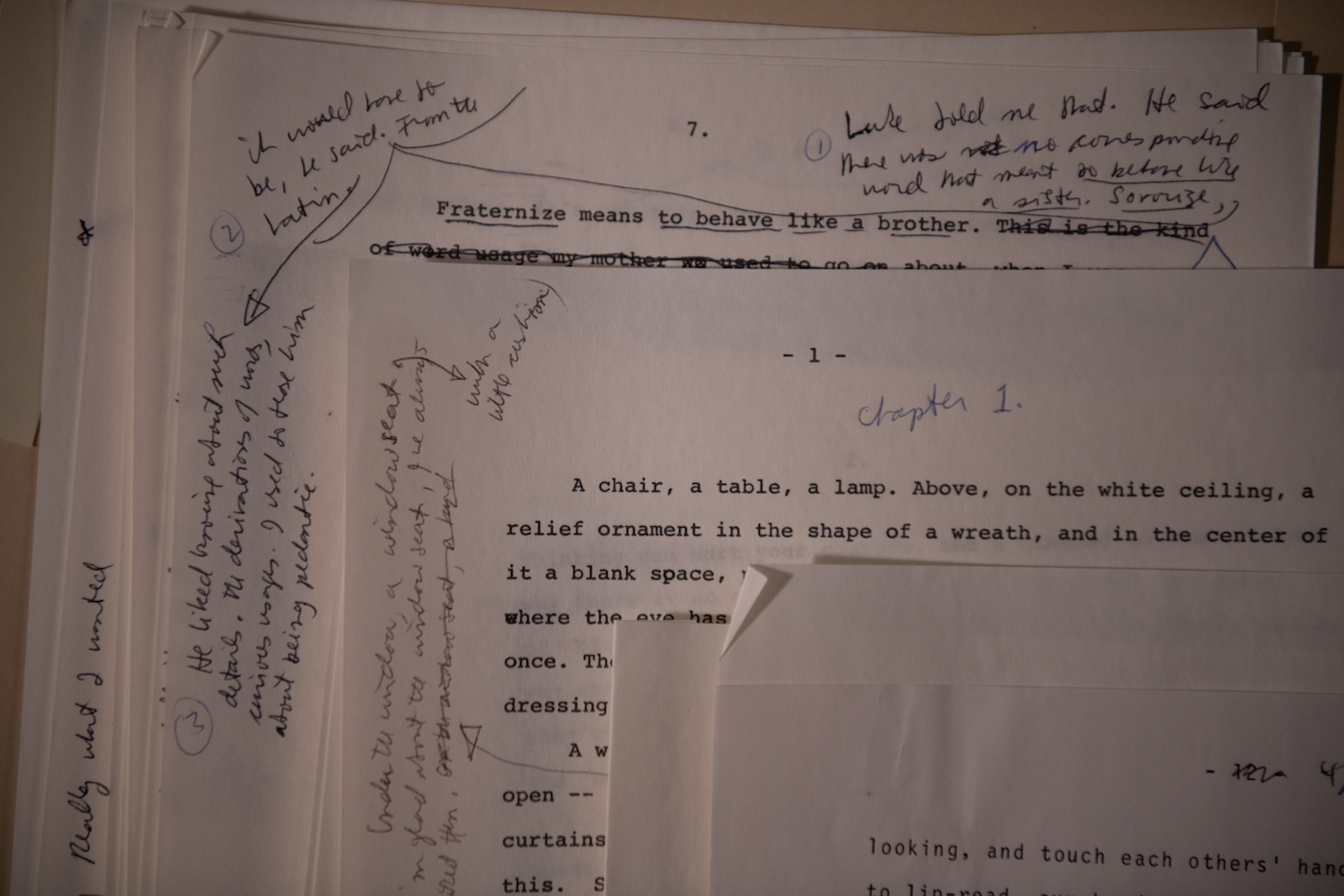- Home |
- Search Results |
- Margaret Atwood on the real-life events that inspired The Handmaid’s Tale and The Testaments
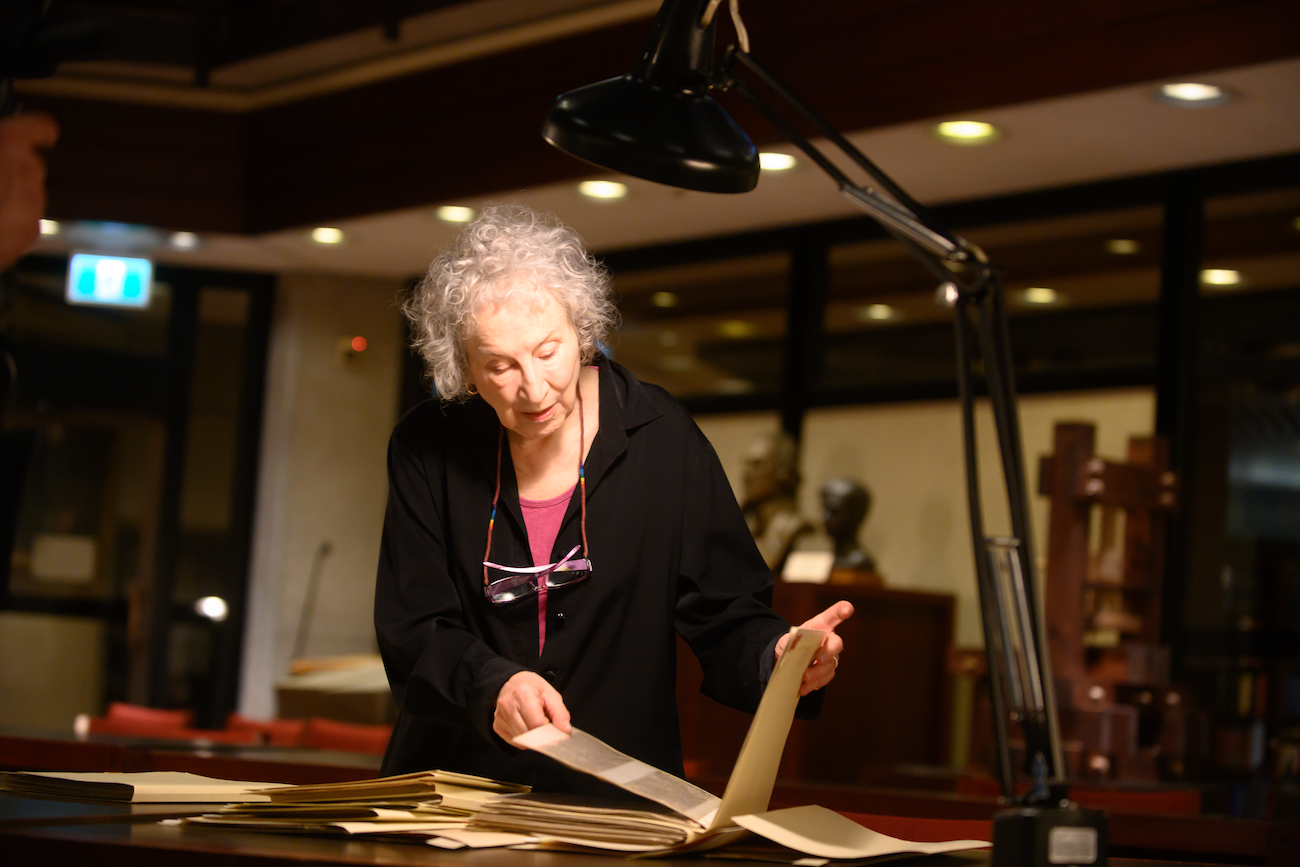
Since its release in 1985, Margaret Atwood has been asked the same question about The Handmaid’s Tale: ‘how did you come up with this stuff’? Her answer has always been the same, that the terrifying events of the novel all have their precedents in some of the darkest chapters in world history.
Here, during a trip to the University of Toronto where the archives for her classic novel are kept, Atwood speaks about what precisely those events are, from the brutal Communist reign of Ceaușescu in Romania to the battles waged over female rights in America during the 1980s.
It is a rare insight into what galvanised the author to write what is proving to be the most prescient dystopia of our times and its new sequel, The Testaments. And like both novels, her answers are a reminder of what we shouldn’t take for granted in 2019.
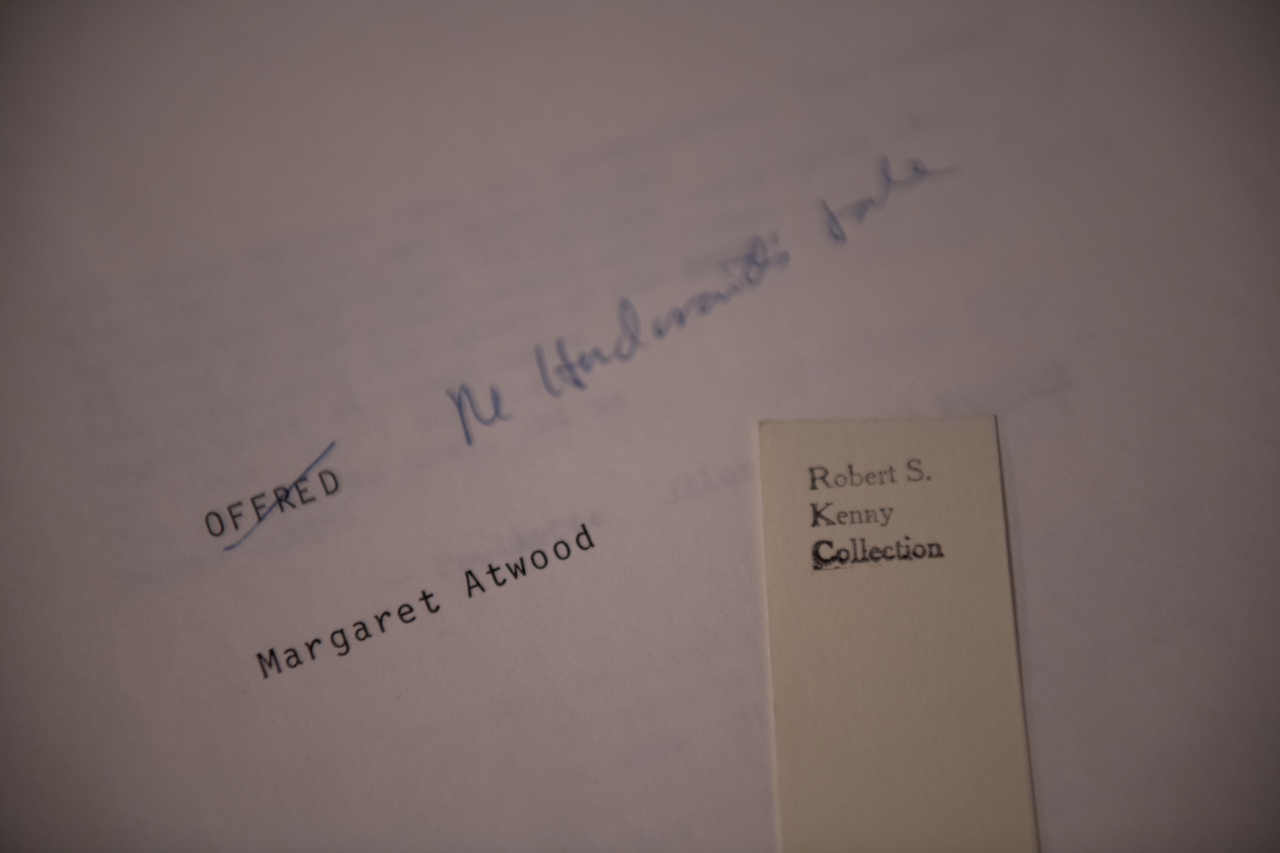
Q: Hello, Margaret. It’s very exciting to see you here in the Fisher Library, reunited with the boxes of historical sources, ideas and materials you collected for The Handmaid’s Tale. Can you tell us more about what’s inside?
MA: There’s a lot to rummage through, but let’s start with this. This would be the first draft. It was called Offred before I changed the title.
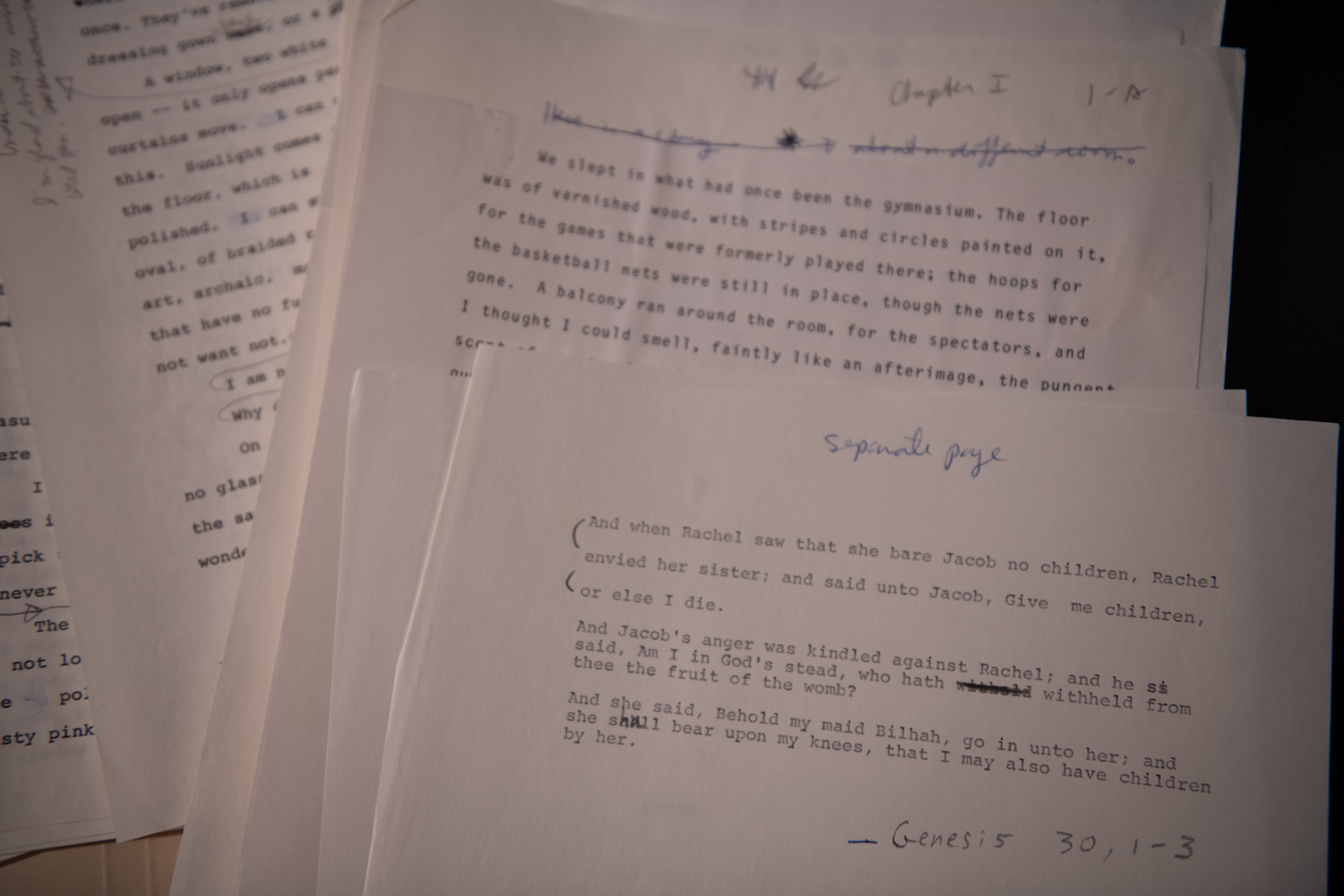
These are the early epigraphs which I didn’t use, but they’re pretty interesting. I found better ones in the end. These ones were a bit too obvious. The first is from Dora Forster, who in 1905 wrote a book called Sex Radicalism: As Seen by an Emancipated Woman of the New Time: ‘I hope the scarcity of children will go on until motherhood is honoured at least as much as the trials and hardships of soldiers campaigning in wartime. It will then be worthwhile to supply the nation with a sufficiency of children.’ And this one is from the 1980s, by Charles J. Lumsden and Edward O. Wilson, who wrote about the relationship between biology and culture: ‘The great majority of economically more primitive societies are polygamous, and the number of wives is generally regarded as a measure of masculine success.’ And then there’s the one I did use, from the Rachel and Leah story: ‘Give me children, or else I die.’
Q: What are all these newspaper clippings?
MA: They are Handmaid’s Tale background material. They’re nicely sorted and laminated. ‘Women forced to have babies.’ This is an article about Ceaușescu and Romania. He passed laws that said women had to have four babies. They had to have pregnancy tests every month and if they weren’t pregnant they had to explain why. ‘The latest sicko Red ruling was announced by cold-blooded Romanian president Nicolas [sic] Ceaușescu, who wants women to have more babies so the country will get richer.’ It was this policy that filled up the Romanian orphanages, which then became a scandal around the world for their inhumane conditions.
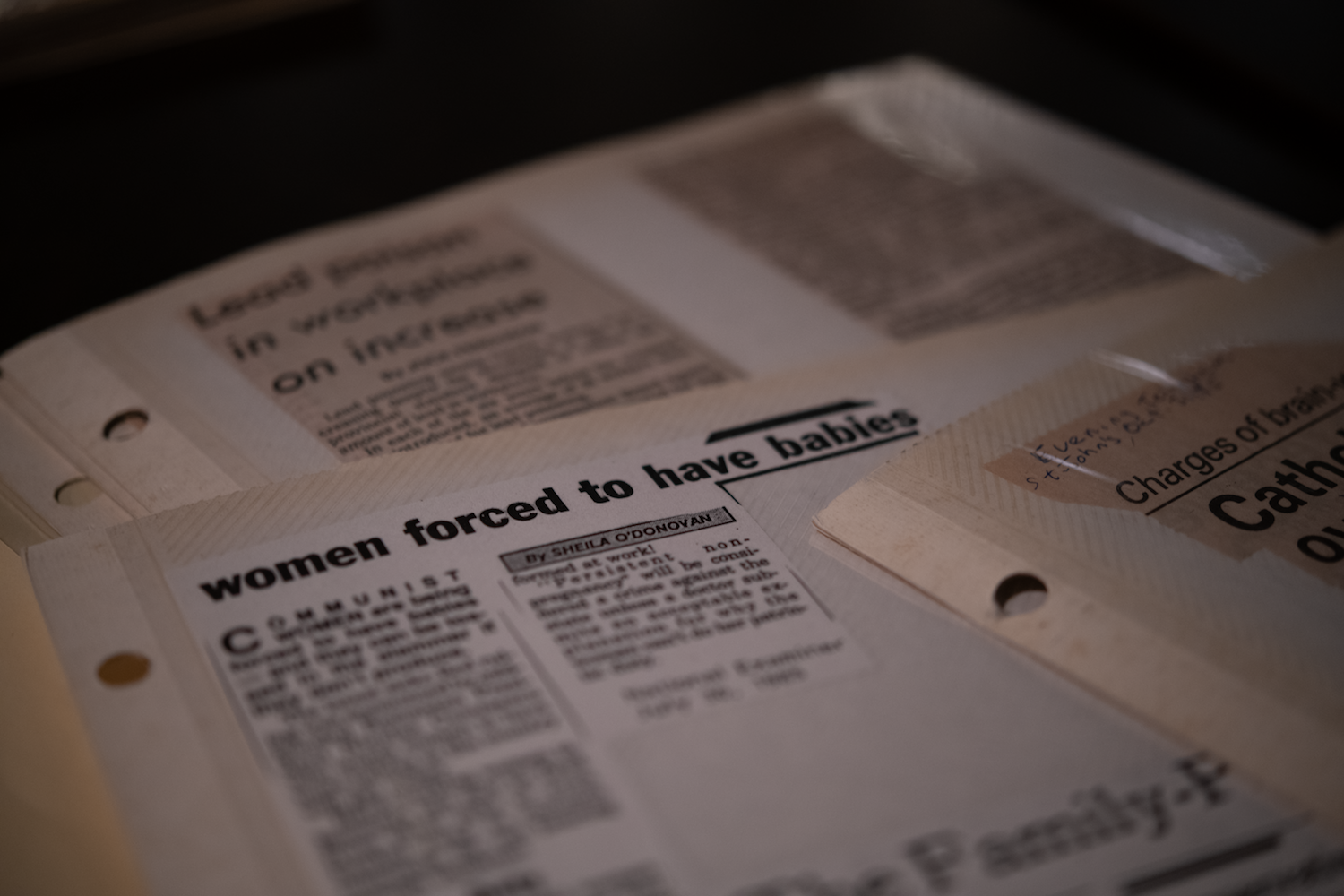
Here’s another piece: ‘Conservatives are out to get the women’s movement. They wish to attack birth control and voluntary sterilization. Their eventual target is to wipe out the women’s movement.’ And this is a good headline that highlights religious tensions: ‘Catholics say cult taking over.’ It’s about a cult called the People of Hope that ‘subordinates its women, discourages social contact with non-members, arranges marriages, moves teenage disciples to households for indoctrination . . . their treatment of women is very Islamic. It’s a form of brainwashing.’
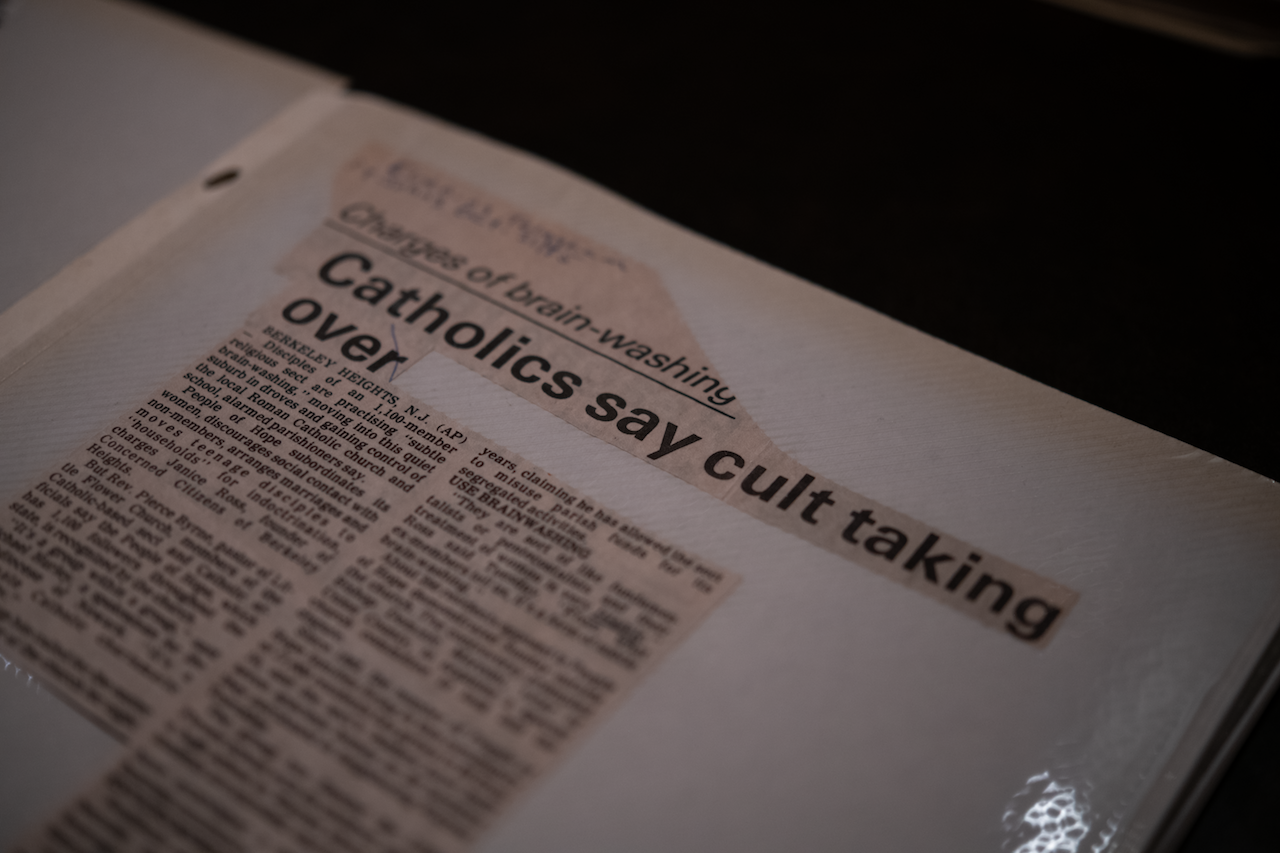
Here’s a batch of headlines about chemicals affecting fertility: ‘Lead-poison in work place on increase,’ ‘Perilous chemical problem out of control,’ ‘Billion-dollar Agent Orange trial opens.’ This one relates directly to The Handmaid’s Tale: ‘Infertility: not uncommon male problem, but often treatable.’ In Gilead, male infertility is similarly glossed over – there are no infertile men, only women.
This is a particularly good one: ‘Birth dearth is a deliberate myth. The super-patriotic, hyper-capitalists running America these days are deciding that we must do “it” more often . . . We’re not breeding fast enough to keep ahead of the dirty commies and dusky third-worlders.’ This was in 1986, but it’s the same stuff that’s happening now. Though I don’t think you’d get quite such plain speech in a newspaper these days.
Q: What was your intention in collecting all these clippings?
MA: My intention was just to document what I was doing and had done. As somebody on Twitter put it, ‘How do you come up with this shit?’ As if I invented it. Here’s one from 1985, which is when I was finishing The Handmaid’s Tale: ‘What causes the high rate of infant death in the US? Especially among black people?’ That is still being written about. ‘Battle of the sexes rages on as Soviet women gain clout,’ ‘Overworked mothers and frustrated career women,’ ‘Rights gains imperilled,’ ‘Village moneylenders sometimes take an infant from the farmer to punish him for not paying a loan. She’s later married off to anyone, or kept as a maid,’ ‘Reducing access in Saskatchewan to abortions,’ ‘Slavery and human progress,’ ‘Missing children,’ ‘Baby stealing,’ ‘Disappearing children.’ Gives a pretty vivid picture of what was on people’s minds then, doesn’t it?
Q: It must have been very intense researching this way.
MA: I didn’t even research it. There was no Internet then, you couldn’t just go online and put in a topic, so this is just stuff I came across when reading newspapers and magazines. I cut things out and put them in a box. I already knew what I was writing about and this was backup. In case someone said, ‘How did you make this up?’ As I’ve said about a million times, I didn’t make it up. This is the proof – everything in these boxes.
There’s so much of it. ‘Ayatollah Khomeini’s slaughterhouse. The jails of Iran.’ Here’s one about Klan-watch, an organization that tracked the Ku Klux Klan. White supremacists were very active then. ‘Liberation theology, why is the Vatican so worried?’ Death row. The battle of the Bible belt. In 1985 racists in the US were preaching revolution: ‘US conservatives push new order – the push to the right.’ And religion was a significant part of that whole movement: ‘Racism and religion a potent brew,’ ‘Evangelist moles running for US president,’ ‘The power and influence behind America’s right’ – meaning the rise of the religious right.
Talking of the rise of the right, here’s a piece about the Lebensborn movement in Nazi Germany, when SS men were given racially pure extra ‘wives’ to make more little SS men: ‘Why Nazis slaughtered own super-race babies . . . The super-race child would be bred for looks and loyalty, stalwart, tall, blond-haired and blue-eyed. Nazism would be his creed, Adolf Hitler his god...’
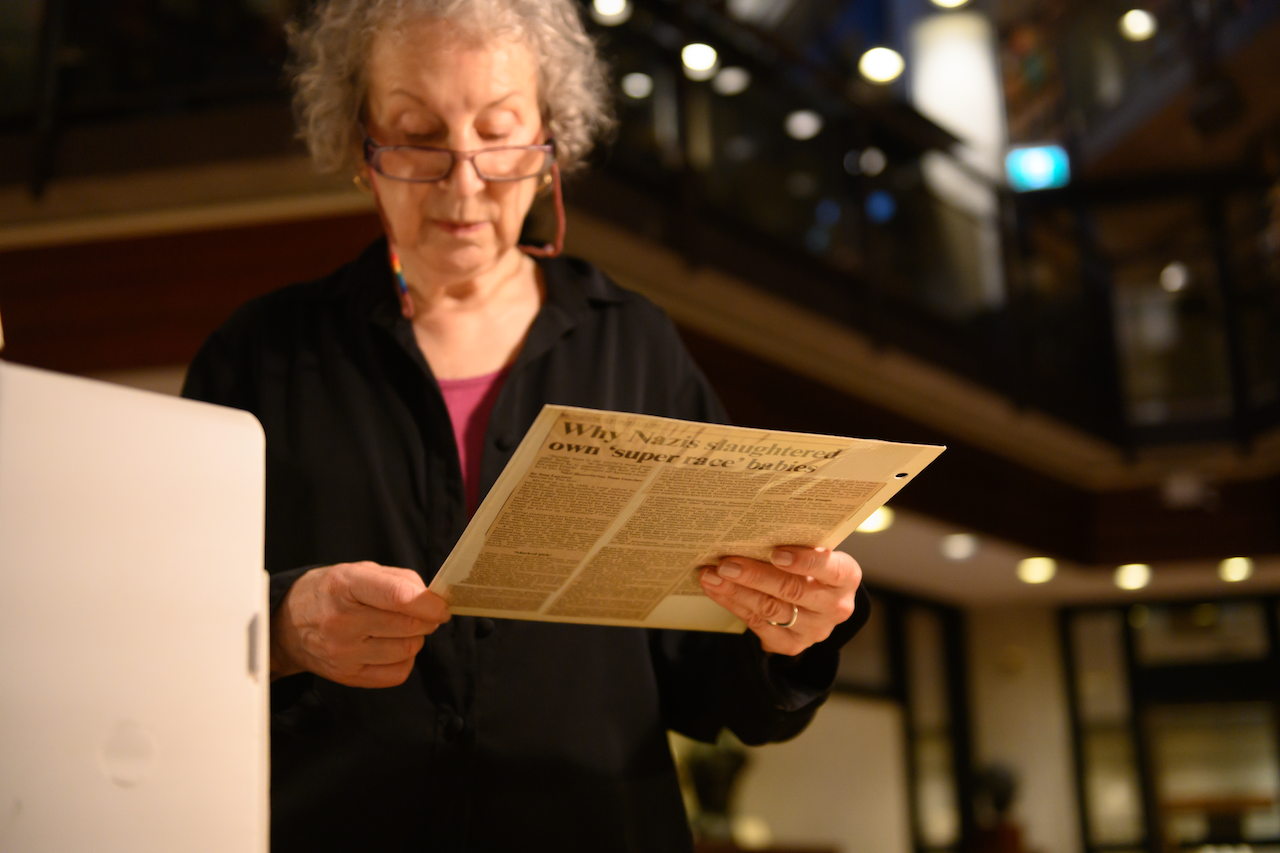
Here’s an even better one about the birth dearth: ‘Make a baby for Christmas, MP tells Canadians.’
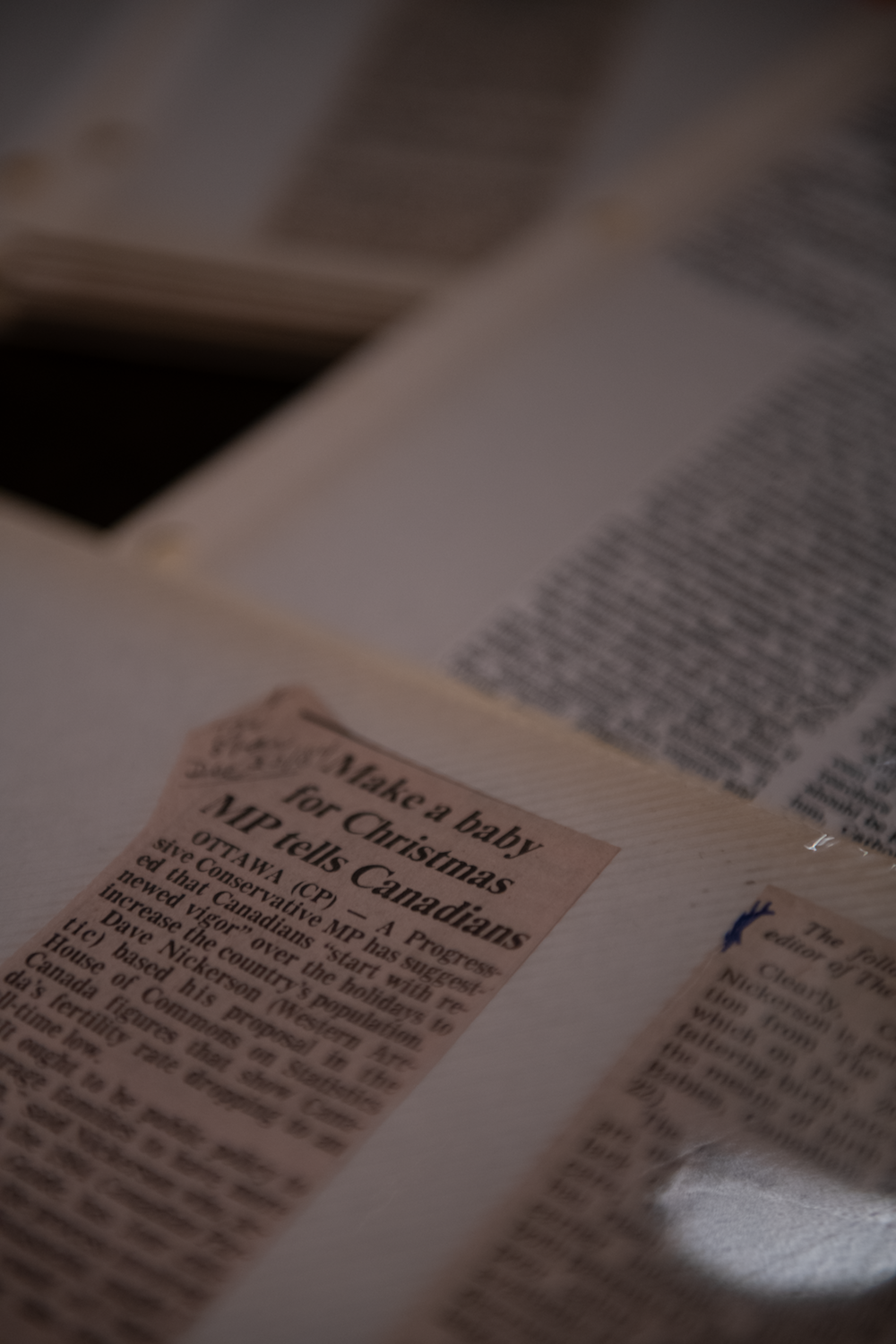
A progressive conservative MP has suggested that Canadians start with renewed vigour over the holidays to increase the country’s population. Dave Nickerson, Western Arctic, based his proposal in the House of Commons on Statistic Canada figures that show Canada’s fertility rate dropping to an all-time low. ‘It ought to be public policy to encourage families to have more children,’ said Nickerson, ‘in that the process involved is not unduly distasteful. Might I suggest that we could all start with renewed vigour this Christmas.’” Which leads nicely into this one, I think: ‘Artificial birth methods are attacked by some feminists fearing male control. There is concern that we are moving toward methods that are not always in the best interests of individual women,’ says a sociologist. No kidding.
‘The smart card: how to make a plastic payment,’ ‘Electronic debit cards met with resistance,’ ‘Germans computerize identity cards.’ Aha! Don’t say I didn’t warn you!
Q: Yes, what is it with you and debit cards? You seem to have a thing about them.
MA: Whenever you put your card into a machine, that machine knows where you are. It’s a tracker. And the other thing of course is that if you wanted to single out a particular group, you could very easily just cut off their cash. Which is what happens to women at the start of Gilead. Nowadays there are a lot more ways of tracking people, through the GPS on their phone and so on, and it’s not just cash that can be stopped. Now you can cut off access to the whole of the Internet, as India has just done in Kashmir. In China, Facebook and other social media sites are blocked and the Communist Party have their own internal network they can monitor. Like any human technology, there’s a plus side, a minus side, and a stupid side you didn’t anticipate. Pick out any technology, it’s true of them all.
Q: Have you noticed how if you talk about something, then all of a sudden it’s being advertised on your phone and computer?
MA: I know. It’s watching you. But the algorithm doesn’t seem to understand ‘I already bought that’ – stop bugging me about something I already bought, I don’t want another one.
We should probably get back to the boxes, shouldn’t we? Friends of the Earth. Already started in 1985. Toxic chemicals poisoning babies. A lot on toxic chemicals and waste. Greenpeace. Arctic preservation. Quotes about the US. One from Carlos Fuentes: ‘What the US does best is to understand itself; what it does worst is to understand others.’ Still going as topics. How long ago all of this was, and how current it still is.
Q: What’s that? Is it another piece of a manuscript?
MA: It’s a handwritten piece about The Handmaid’s Tale which I must have sent to somebody or other. Who knows. It looks like it was in 1986.
Q: Would you like to read from it?
MA: When I first began thinking about The Handmaid’s Tale way back in 1981’ – that’s interesting: apparently I was thinking about it as early as 1981 – ‘I thought it was a very strange sort of book for me to be writing. Also I was afraid people would think it was merely paranoid. Like many books, The Handmaid’s Tale began with the question, What if? I guess I was tired of having people say, ‘It can’t happen here.’ They were right only if you accepted their definition of ‘it.’ ‘It’ could mean Russian-style communism or Germany under Hitler, but what if we were looking at the wrong ‘it’; what if while we were busily staring down the wolf at the door, another one was creeping over the back fence? Once any democracy starts curtailing freedom in the name of freedom, it may land us in trouble. What if you wanted to take over the US today? What flag could you wave successfully? The Handmaid’s Tale is one answer to these ‘What ifs?’ And it goes on from there.
Q: Have your views on this changed? Do you think we are still worried about the wrong “it”?
MA: What I said then is what I’d say now. It hasn’t changed.
Q: Do you have a similar set of clippings for The Testaments?
MA: A lot of the things I was looking at for The Testaments were online. I’ve kept some of those things, but today I would probably be referencing the URLs rather than cutting things out. If I wanted a box I could easily run off those pieces; it’s a form of job creation for the future.
Box or no box, the same rule applied: nothing goes in that there isn’t backup for.
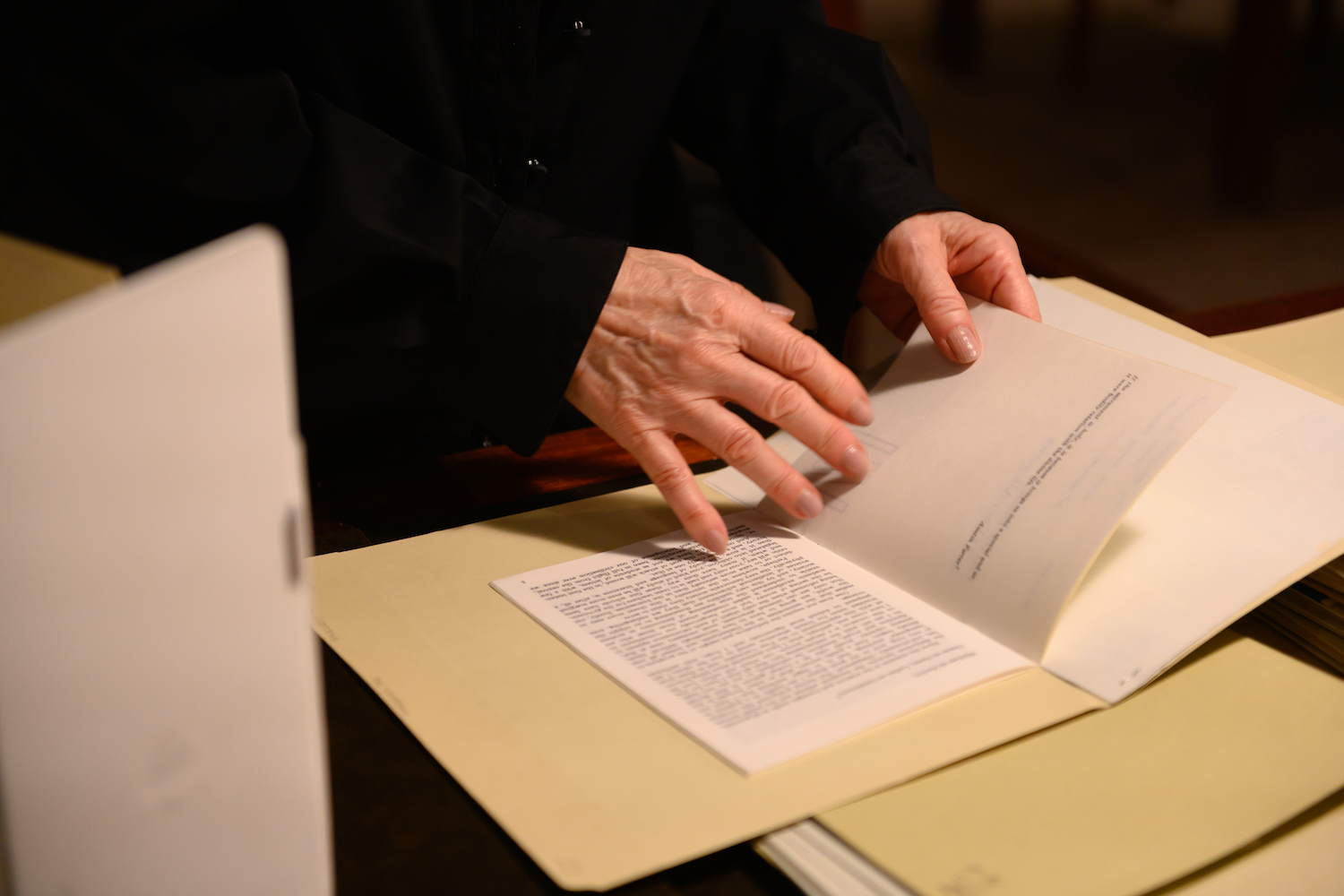
Q: Is there anything else in here you particularly remember?
MA: Yes, I’ve been looking out for all the stuff about forced polygamy. I did actually research polygamy in the States, meaning your old-order Mormons, not just the people who get married again but fail to inform their first wife or the second of that situation. I had a long article about old-order Mormons and how they were circumventing the law. I remember it really well. It was quite funny because in the interview these guys were saying, 'People think this is just fun, it’s not, it’s really hard work. I’m run ragged all the time, running from one wife to the next.' Here it is! I knew it had to be in here somewhere. 'The private place of plural marriage.' Here’s a good bit—the guy says, 'Sometimes I take them out individually, and sometimes I take all the wives out. It’s really a strange and interesting experience to have your wife help you get ready for a date. As I was going out of the door one time when we were on our honeymoon, Betty was brushing me off and making sure I looked nice and saying, ‘Don’t be bashful, just step up and put your arm around her..''
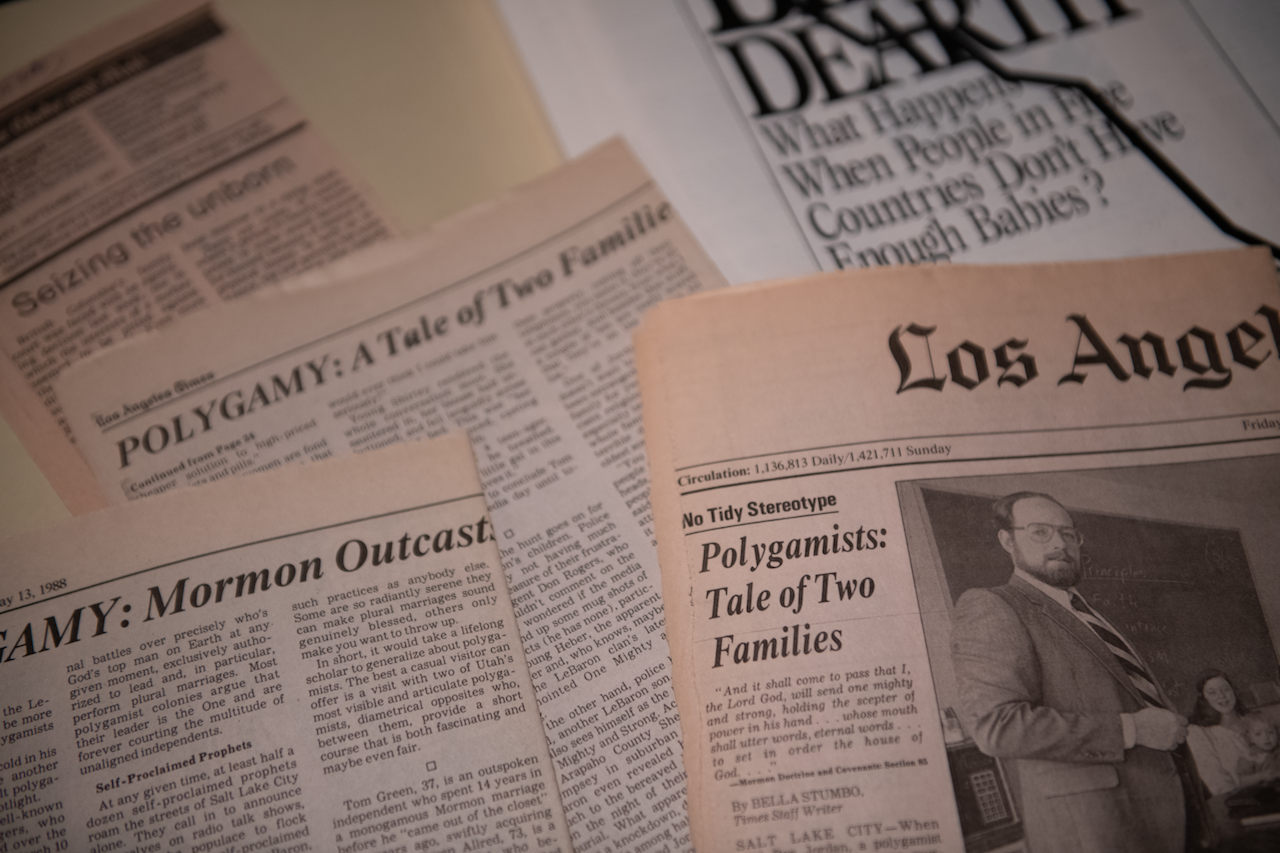
Q: There’s a TV show about that now, a Mormon reality show.
MA: Really? And how’s that going over?
Q: It’s a huge hit.
MA: A huge hit! I have a clipping from the 1950s about how to be a good wife, with all these things you have to do and have not to do, and so forth. And women read it and they say, 'This is horrible.' And men read it and they say, 'This sounds pretty good.' It contains gems like: 'Never question your husband, he is the head of the household, even if he doesn’t come home all night. He knows what he’s doing. And you don’t have to know what he’s doing . . .'
That was certainly relevant to The Handmaid’s Tale thirty-five years ago, but it’s clearly also still relevant to your 2019 hit reality TV show, too. How nice! All of these pieces I’ve been looking at and reading from are from 1984, 1985, and 1986. These are topics that are still with us today, in fact even more so if anything.
